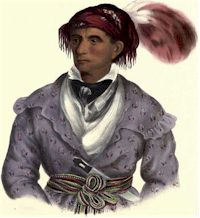Mikasuki Tribe
Mikasuki Indians, Mikasuki Tribe. A former Seminole town in Leon County, Florida, on the west shore of Miccosukee lake, on or near the site of the present Miccosukee. The name has been applied also to the inhabitants as a division of the Seminole. They spoke the Hitchiti dialect, and, as appears from the title of B. Smith’s vocabulary of their language, were partly or wholly emigrants from the Sawokli towns on lower Chattahoochee River, Alabama. The former town appears to have been one of the ‘red’ or ‘bloody’ towns, for at the beginning of the Seminole troubles of 1817 its … Read more

